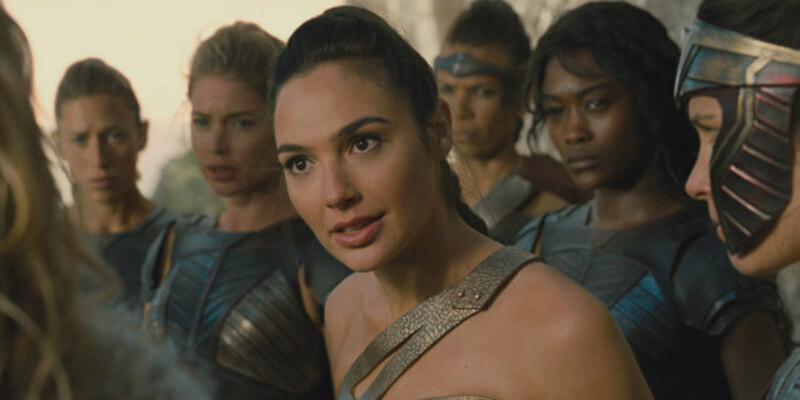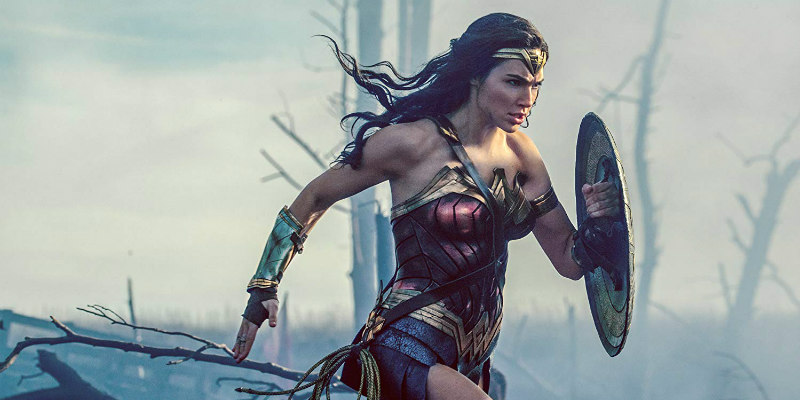Wonder Woman leaves her island home to help end WWI.
Directed by: Patty Jenkins
Starring: Gal Gadot, Chris Pine, David Thewlis, Robin
Wright, Connie Nielsen, Danny Huston, Lucy Davis
There's a moment in DC Comics' Wonder Woman's first standalone movie in
which Gal Gadot's Diana Prince is perusing an item in The Louvre when
she is interrupted by a sound that's sadly become all too familiar in
Western European cities - the boom of an explosion, followed by police
sirens. We don't see how she resolves the situation; instead we're left to
err...wonder how the superheroine might deal with modern day terrorism. I'm
still wondering, as despite sitting through a 2hr 20 mins film called
Wonder Woman, I still know very little about the alliterative hero in question.
This may be director Patty Jenkins' film, but its basic story was
laid down by Zack Snyder, who has now done for Wonder Woman what he
did for Superman, i.e turned an inspirational hero into an over-emotional,
murderous sociopath. WW speaks a lot about peace, but she kills more people
in this movie than most super-villains. The movie lays down its hypocritical
notions of heroism early on with a very Snyder-esque sequence in which we
learn of how Zeus created an island of Amazonian women (part Renaissance
Fair, part Lilith Fair) whose duty was to defend the world from the evils of
men. We're told that their peaceful ways were a counterpoint to the violent
nature of the male species, yet their entire daily routine seems to consist
of preparing for battle, and when strangers turn up in the form of the WWI
era German Navy, they immediately open fire on the interlopers, killing them
all save one, Chris Pine's American spy Steve Trevor.
Despite the film's title, this is arguably more Trevor's story than WW's.
Possibly due to Gadot's limited range (she's great with the physicality of
the role, and performs adequately in the comic moments, but given more than
two lines of dialogue, she doesn't fare so well), she's somewhat sidelined,
a cross between a hench-person, called upon anytime some ass needs kicking,
and the sort of 'born sexy yesterday' woman-child archetype that has plagued
sci-fi movies since their inception. The relationship between herself and
Trevor consists largely of the latter mansplaining the ways of the world
while the former throws hissy fits.
For a movie whose marketing has heavily hyped its feminist credentials,
Wonder Woman isn't shy about imbuing its protagonist with that
most damaging of negative female stereotypes, the still persistent notion
that women can't control their emotions. Whenever presented with an
obstacle, WW blows her top, acting without thinking, in contrast to the
rational men around her. The film's faux progressiveness extends to a pair
of side characters - a Native-American (named 'Chief', of course!) and a
North African, members of a motley crew assembled by Trevor - whose sole
purpose seems to be to tell us the movie has cast some non-white actors
(both literally verbalise their ethnicity, in case we hadn't figured it
out). Ironically, despite their competent skills, it's a useless white man
(Ewan Bremner as a sniper who can't shoot straight) who gets far more
attention.
Those flaws aside, for the most part Wonder Woman is a fun
romp, at its best when evoking classic derring-do pulp fiction, less
successful when it believes it has something profound to say about humanity.
Save for the obligatory overlong and overblown climax in which our hero
battles a giant robot/alien/god/whatever against an indecipherable CG
backdrop, the action sequences have a spring in their step and don't outstay
their welcome. Jenkins constructs such scenes in a coherent manner that her
peers would do well to observe, breaking large scale battles down into
manageable and relatable chunks, and the Metal-esque theme that accompanies
WW's heroics adds a shot of adrenalin.
The film's first half has an agreeably light touch, with Lucy Davis a
standout as Trevor's caustic secretary in the fish out of water London
section (the movie's most enjoyable sequence, as WW contends with early
twentieth century sexism). As the initial villains,
Danny Huston's General Erich Ludendorff (who, despite the WWI
setting, is for all intents and purposes a Nazi) and Elena Anaya's Doctor Poison commendably embrace the camp nature of such comic book
antagonists. If the first half gives us a W.E. Johns' inspired tally-ho take
on WWI, the second half opts for the not so escapist grime of Siegfried
Sassoon. It's a jarring shift in tone, and a reminder that Zack Snyder is
ultimately in charge of this cinematic universe.
Wonder Woman is on Netflix UK/ROI
now.






